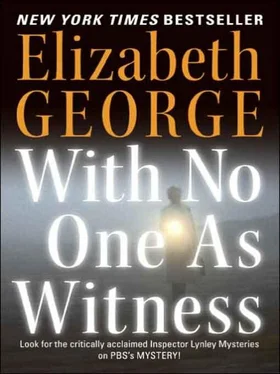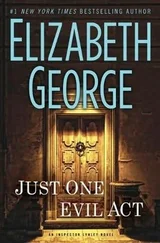“Could be the Queen Mum’s for all I care,” Nkata remarked. “We got the bastard.”
The families could be given the news now. There would be no satisfactory justice for them; there never was. But there would be a conclusion.
Nkata drove Barb back to St. Thomas’ Hospital to arrange for her car to be towed away and put into running order again. There, they parted, and when they did, neither of them looked at the hospital itself.
Nkata headed towards New Scotland Yard. It was nine in the morning by then, and traffic was slow. He was negotiating Parliament Square when his mobile rang. He reckoned it was Barb, all attempts at coping with her car a failure. But a glance told him the number was not one he knew, so he said, “Nkata,” and nothing else.
“You arrested him, then. It was on the news this morning. Radio One.” A woman’s voice spoke, familiar, but not one he’d heard on the phone before.
“Who’s this?”
“I’m glad it’s over. And I know you meant good towards him. Towards us. I know that, Winston.”
Winston . “Yas?” he said.
“I knew it before but I d’in’t want to look at what that meant, unnerstan? I still don’t. Want to look at it, I mean.”
He considered this, considered the fact she’d phoned at all. “C’n you give it a glance, you think?”
She was silent.
“A glance’s not much, innit. Just a flick when you move the eyes. Tha’s all. Not looking at nothin, really, Yas. Just sneaking a look. Tha’s it. Tha’s all.”
“I don’t know,” was what she finally said.
Which was better than things had been before. “When you do know, you ring me, then,” he told her. “Waitin’s not a trouble to me.”
LYNLEY RECKONED that one of the reasons they forced him to stay in Casualty was their worry that he would do something to Kilfoyle if they released him. And the truth was that he would have done something, although not what they obviously thought he would do. Instead, he would merely have asked a question of the man: Why? And perhaps that question would have led to others: Why Helen and not me? And why in the way he had done it, with a boy in his company? What sort of statement did that make? Power? Indifference? Sadism? Pleasure? To destroy as many lives as possible in as many ways as possible in one swift blow because he knew the end was coming? Was that why? He’d be famous now, infamous, notorious, with all the attendant bells and whistles. He’d be up there with the best of the best, those names like Hindley that would forever light the firmament of iniquity. Avid followers of crime would flock to his trial and writers would document him in their books and he would thus never fade from public memory like an ordinary man or, for that matter, like an innocent woman and her unborn child, both dead now and soon to become yesterday’s news.
Obviously, those in power had believed that Lynley would spring to the attack if he came face-to-face with the monster again. But springing to the attack suggested a life force within, driving one forward. That was gone from him now.
They said they would release him to a relative and, since they had his clothing tucked away somewhere, he was forced to wait until a member of his family arrived. They had no doubt suggested in their phone call to Eaton Terrace that that person take as long as possible in making the trip to the hospital, so it was midmorning when his mother came to fetch him. She had Peter with her. A taxi, she said, was just outside.
“What’s happened?” She looked older to him than she had days earlier. He understood from this that the experience in living chaos, which they all were enduring, was taking a toll on her as well. He hadn’t thought of that before. He wondered what it meant that he thought of it now.
Beyond their mother, Lynley’s brother stood, lanky and ill at ease, as always. They’d been close once, but that was years in the past, with cocaine and alcohol and fraternal abandonment leering like spectres in the space between them. Too much disease ran through his family, Lynley thought, part of it of the body, the rest of it of the mind.
Peter said, “You all right, Tommy?,” and Lynley saw his brother’s hand reach out, then drop uselessly to his side. “They wouldn’t tell us on the phone…just to fetch you, they said. We thought…They said you’d come from near the river. But up here…What river? What were you-”
His brother was afraid, Lynley thought. Another possible loss in his life and Peter did not know how he’d cope with that if he had no crutch to lean upon: up the nose, in a vein, out of the bottle, whatever. Peter didn’t want that, but it was always out there, beckoning to him.
Lynley said, “I’m all right, Peter. I didn’t try anything. I won’t try anything,” although he knew that latter statement was neither a promise nor a lie.
Peter chewed on the inside of his lip, a habit from his childhood. He gave a nervous nod.
Lynley explained what had happened in two simple sentences: He’d had an encounter with the killer. Barbara Havers had taken care of matters.
“Remarkable woman,” Lady Asherton said.
“She is,” Lynley replied.
He discovered that Ulrike Ellis had been released to the police several hours earlier to make her statement. She was shaken, he learned, but otherwise unharmed. Kilfoyle had done nothing save stun her, gag her, and restrain her. That was bad enough but so far from what it could have been that it was ludicrous to suggest she would not recover.
In the taxi, he sank into a corner, his mother next to him and his brother perched on the jump seat opposite. He said to Peter, “Tell him Scotland Yard,” and his mother protested with, “You’re to come straight home.”
He shook his head. “Tell him,” and nodded towards the driver.
Peter leaned to the opening in the shield between driver and passengers. He said, “Victoria Street. New Scotland Yard. And after that, Eaton Terrace.”
The driver swerved into the street with the flow of traffic and headed in the direction of Westminster.
“We should have stayed with you, at the hospital,” Lady Asherton murmured.
“No,” Lynley said. “You did what I asked.” He looked out of the window. “I’ll want to bury them at Howenstow. I think that’s what she would have wanted. We never discussed it. There was no need. But I’d like-”
He felt his mother’s hand take his. “Of course,” she said.
“I don’t know when yet. I didn’t think to ask when they’d release the…her body. There are all sorts of details…”
“We’ll handle things, Tommy,” his brother said. “All of them. Let us.”
Lynley looked at him. Peter was leaning forward, closer to him than he’d been in ages. Slowly he nodded his agreement. “Some of them, then,” he said. “Thank you.”
They rode the rest of the way in silence. When the taxi made the turn from Victoria Street into Broadway, Lady Asherton spoke again. She said, “Will you let one of us come in with you, Tommy?”
“There’s no need,” he told her. “I’ll be all right, Mum.”
He waited till they drove off before he entered. Then he went inside, not to Victoria Block but to Tower Block. He made his way to Hillier’s office.
Judi MacIntosh looked up from her work. Like his mother, she seemed to be able to read him, and it appeared that what she read was accurate, for he had not come for a confrontation. She said, “Superintendent, I…All of us here…I can’t imagine what you’re going through.” She held her hands at her throat, as if beseeching him to relieve her of saying anything more.
He said, “Thank you,” and he wondered how many more times he would have to thank people in the coming months. Indeed, he wondered what he was even thanking them for. His breeding called for this expression of gratitude when he wanted instead to raise his head and shriek into the eternal night that was falling round him. He despised good breeding. But even despising it, he relied upon it again when he said, “Would you tell him I’m here? I’d like a word. It won’t take long.”
Читать дальше












